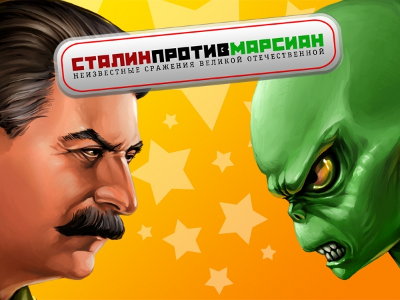Против
The word против in Russian means “against” in the sense of being for or against an idea. It can be used adverbially, without an object:
| — Мы решили поехать кататься на лыжах. Ты не против? — Нет, совсем не против. Я с удовольствием поеду. |
“We decided to go on a ski trip. Are you okay with that?” “I'm not at all against it. I'll be happy to go.” |
In the above dialog the phrase that is translated “Are you okay with that?” literally means “You aren't against?” This is one of those places where a word for word translation would get the tone of the dialog wrong; instead a good translator will select a phrase in English that matches the emotional content of the original. Another example:
| В июне девяносто шестого года Лужкова выбрали мэром Москвы. Девяносто пять процентов населения проголосовало за него, и только пять процентов против. | In June of ninety-six Luzhkov was elected mayor of Moscow. Ninety-five percent of the population voted for him, and a mere five percent against. |
The word против can also be used as a preposition that governs the genitive case:
| Кто не с нами, тот против нас. | Whoever is not with us is against us. |
| Во второй мировой войне русский народ сражался против нацистов. | In the second world work the Russian people struggled against the Nazis. |
Hm... what other things have the Russians battled against? Ah, yes, here's a glorious reminder of one of the lesser known battles of World War II:

Can you read the sign? That's right: STALIN VERSUS THE MARTIANS! What, dear reader? You didn't know that Stalin saved the planet from evil aliens while also fighting the Nazis? That is because you have an American education and can't tell the pax romana from the chicken pox. This vital battle is commemorated in an RTS game by BWF/DreamLore/N-Game. In short, it's an übersimplified version of Blitzkrieg II (review here). Do you want to know more? Do you want to see Stalin dancing like a raver kid strung out on Ecstasy? Then you need to view this trailer:
Attentive students will notice that Stalin's Russian is not so great. That's because he was an ethnic Georgian who never really perfected the language. Russians love to poke fun at people what can't talk right.
Лист (часть первая)
 Just recently I have been thinking about the things that I miss since I moved to Phoenix. I was going though the pictures I took on my fall trip to the East Coast. The first thing that catches the eye is gorgeous trees dressed in their colorful gowns: red, yellow, green, and anything in between. While adults enjoy the pretty view and romantic walks in the park, the kids have the best time running around and diving in a huge pile of leaves... at least in Russia they do
Just recently I have been thinking about the things that I miss since I moved to Phoenix. I was going though the pictures I took on my fall trip to the East Coast. The first thing that catches the eye is gorgeous trees dressed in their colorful gowns: red, yellow, green, and anything in between. While adults enjoy the pretty view and romantic walks in the park, the kids have the best time running around and diving in a huge pile of leaves... at least in Russia they do ![]()
| The word leaf in Russian is «лист». It can be any tree leaf as well as fig, cabbage, laurel, currant, or a oak leaf. We have a rather well used expression with the latter: |  |
| Пристал, как банный лист! | "He follows me everywhere like a puppy dog!" |
This expression is used when one person constantly follows the other to ultimately express his or her affection for them without the subject’s consent or reciprocation. It literally means “He has stuck to me like a sauna leaf.” This saying comes from the famous Russian bathhouses, where hitting oneself with a bundle of green birch twigs while steaming is considered a great cleansing procedure. The repeated thrashing eventually breaks the leaves off the twig, and they stick as flat as can be on your sweat-soaked body. Now that is a great image.
The plural form of the word «лист» is «листья».
| Я люблю гулять по осеннему парку, усыпанному золотыми листьями. | "I love walking in the park in the fall when it is covered in golden leaves." |
| Дворник собрал опавшие листья. | “The street sweeper gathered the fallen leaves.” |
| — Какой лист является символом Канады? — Кленовый, конечно! Ты разве не видел их флаг? |
“Which leaf is a symbol of Canada?” “Maple, of course! Haven't you seen their flag?” |
Do note carefully how the noun is declined in the plural:
| Sg | Pl | |
| Nom | лист | листья |
| Acc | ||
| Gen | листа | листьев |
| Pre | листе | листьях |
| Dat | листу | листьям |
| Ins | листом | листьями |
Там
The Russian word for ‘there’ in the sense of being located ‘there’ is там.
| — Разве ты не знаешь, что Серёжа служил в Афганистане? — Серьёзно? Удивительно, как он там выжил. |
“Didn't you know that Sergei served in Afghanistan?” “Really? I'm amazed he survived.” |
| — Я очень люблю Москву. — Правда? А я считаю, что там живут только подлизы и негодяи. |
“I really like Moscow.” “Really? I think only brown-nosers and jerks live there.” |
Of course, it's used in much simpler sentences as well.
| Там сегодня нет лука. | “There are no onions there today.” |
| Я там не был. | I've never been there. |
The one thing we as Americans have to be careful about is not to use the word when talking about going ‘to’ a place. In other words, you can't say in Russian «Я там езжу каждое лето» “I go there every summer.” For that sense we have to use туда, which we will address in the next couple of days.
Отсюда
Russian has a specialized adverb that means “from here,” and that word is отсюда. Sometimes you can find it in extraordinarily short sentences that confound beginners:
| Вон отсюда! | Get the heck out of here! |
| Иди(те) отсюда! | Get out of here! |
The word combines naturally with verbs of departure, although it can often be left out of as well, just as in English:
| Поезда (отсюда) отбывают каждые пять минут в час пик. | During rush hour trains leave (from here) every five minutes. |
| Когда она (отсюда) ушла, я думал, что я её в жизни больше не увижу. | When she left (from here), I thought that I would not see her again in the land of the living. |
The old-fashioned word for отсюда in English is hence. Nowadays it is mostly used when discussing the source of a logical conclusion. The Russian word can be used the same way:
| В этом магазине продаются только китайские товары. Всему миру известно, что всё китайское производство — барахло. Отсюда вывод — здесь ничего покупать не стоит. | This stores sells only Chinese goods. Everybody knows that Chinese products are junk. Hence we conclude that it is not worth shopping here. |
| — Американцы — люди. Все идиоты тоже люди. Отсюда понимаем, что все американцы — идиоты. — Ты не хрена понимаешь в логике. |
“All Americans are people. All idiots are people. Hence we know that all Americans are idiots.” “You don't understand diddly squat about logic.” |
Батон
 It is interesting how similar sounding words mean different things in different languages. I wonder how it came about. Maybe a long time ago a group of friends visiting a foreign land dropped a word in a conversation, while speaking their native tongue. The natives heard it, liked the sound of it and decided to adopt it in their language. However, because they did not know what that word meant, they came up with a whole different meaning for it.
It is interesting how similar sounding words mean different things in different languages. I wonder how it came about. Maybe a long time ago a group of friends visiting a foreign land dropped a word in a conversation, while speaking their native tongue. The natives heard it, liked the sound of it and decided to adopt it in their language. However, because they did not know what that word meant, they came up with a whole different meaning for it.
Take for example батон. In Russian it means an oblong loaf of white bread. However in English button, which sounds similar, has a completely different meaning.
| Я люблю запах свежевыпеченного батона! | I love the smell of a freshly baked loaf of white bread! |
The word батон comes to Russian language from French bâton, which means stick, hence the elongated form of this particular bread loaf.
| Sg | Pl | |
| Nom | батон | батоны |
| Acc | ||
| Gen | батона | батонов |
| Pre | батоне | батонах |
| Dat | батону | батонам |
| Ins | батоном | батонами |
There can also be «батон колбасы» “sausage loaf/stick” or «батончик» a candy bar.
| — Что в магазине покупать? — Возьми хлеб, молоко и батон варёной колбасы. |
“What should I get at the store?” “Get some bread, milk, and a bologna loaf.” |
| Шоколадный батончик «Сникерс»: съел и порядок! | The Snickers chocolate bar: eat it and you're golden! |
I remember when I first started learning English in primary school; I had this girl, Nastya, in my class. She was an “A” student and really good at languages. One time we were working on an exercise together and she decided to play a joke on me. She kept asking me different questions about батон, interchanging the meanings between English and Russian. Even though I knew what button meant in English, I kept falling for it. She would say:
| Ты голодная? Хочешь батон? | Are you hungry? Would you like a loaf of bread? |
When I, being gullible, would say “sure,” she would laugh and exclaim:
| Ты пуговицы ешь? | You eat dress buttons? |
I wonder whatever happened to that girl...
<< 1 ... 72 73 74 ...75 ...76 77 78 ...79 ...80 81 82 ... 158 >>